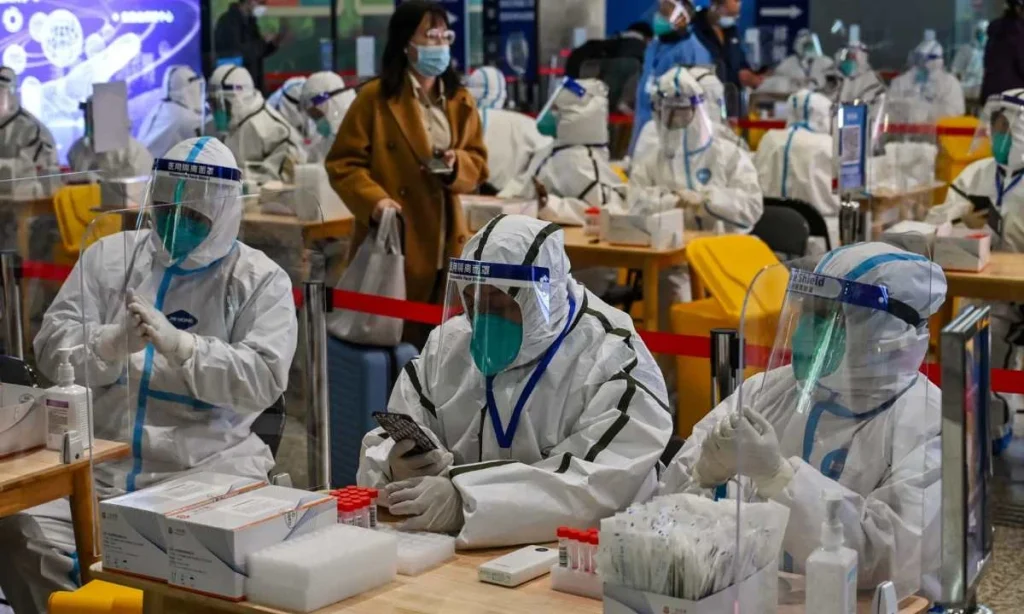China Faces A Deadly Virus Surge Five Years After Covid!
Five years after the world grappled with the COVID-19 pandemic, China is now facing another health crisis—a surge in human metapneumovirus (HMPV) cases. Social media is abuzz with reports of overcrowded hospitals and crematories struggling to cope. The situation is compounded by the circulation of multiple viruses, including influenza A, Mycoplasma pneumoniae, and even COVID-19. While some online users claim that China has declared a state of emergency, official confirmation is yet to be provided.
A New Virus Surge in China
What is HMPV, and What’s Happening in China?
HMPV, or human metapneumovirus, is a respiratory virus that typically causes flu-like symptoms. It mostly affects the upper respiratory tract but can sometimes lead to more severe lower respiratory infections. The virus spreads during winter and early spring, seasons already notorious for respiratory illnesses.
China is experiencing a surge in cases, with children under 14 in northern provinces showing an upward trend. As reported by Reuters, “Recent cases detected include pathogens such as the rhinovirus and human metapneumovirus, with cases of the human metapneumovirus among people under the age of 14 showing an upward trend, especially in northern provinces.”
Government Response
China’s disease control authorities are taking steps to address this wave of respiratory illnesses. A pilot monitoring system for pneumonia of unknown origin is being tested to improve preparedness for unknown pathogens. According to an official quoted by CCTV, the National Disease Control and Prevention Administration aims to “establish a procedure for laboratories to report and for disease control and prevention agencies to verify and handle cases.”
This contrasts sharply with the response five years ago when COVID-19 first emerged. The upgraded system seeks to detect and respond more quickly to potential health threats.

Understanding HMPV: Symptoms, Risks, and Spread
What is Human Metapneumovirus?
HMPV is a virus that primarily affects the respiratory system, mimicking the symptoms of the common cold or flu. Its incubation period is three to six days, with the severity determining how long the illness lasts. While most cases are mild, it can cause severe complications, particularly in high-risk groups.
⚠️ BREAKING:
— SARS‑CoV‑2 (COVID-19) (@COVID19_disease) January 1, 2025
China 🇨🇳 Declares State of Emergency as Epidemic Overwhelms Hospitals and Crematoriums.
Multiple viruses, including Influenza A, HMPV, Mycoplasma pneumoniae, and COVID-19, are spreading rapidly across China. pic.twitter.com/GRV3XYgrYX
Symptoms and High-Risk Groups
HMPV’s symptoms include:
- Cough
- Fever
- Nasal congestion
- Sore throat
- Shortness of breath
Those most at risk of severe illness are young children, older adults, and individuals with weakened immune systems.
How Does HMPV Spread?
The virus spreads through coughing, sneezing, and close personal contact. Unfortunately, there is no specific vaccine or antiviral treatment available for HMPV. As one respiratory expert noted in an interview with National Business Daily, the public should avoid “blindly using antiviral drugs to fight human metapneumovirus.”
The Bigger Picture: Respiratory Diseases in Winter
Why Winter Is a Breeding Ground for Viruses
Winter conditions, such as low humidity and the tendency to gather indoors, create a perfect environment for respiratory viruses to thrive. This explains why China has also reported increases in rhinovirus and influenza A cases alongside HMPV.
Comparison to the COVID-19 Pandemic
Unlike the initial COVID-19 outbreak, China is now better equipped to monitor and respond to new respiratory illnesses. Lessons from five years ago have prompted the creation of more robust surveillance systems. This improved readiness highlights how much has changed in global health strategies.

Prevention and Future Preparedness
Practical Prevention Tips for Individuals
While HMPV has no vaccine, individuals can minimize their risk by adopting simple habits:
- Wash hands with soap for at least 20 seconds.
- Cover your mouth and nose when coughing or sneezing.
- Wear a mask and avoid contact with sick individuals.
- Refrain from touching your face with unwashed hands.
- Stay home and self-isolate if you’re feeling unwell.
Steps to Strengthen Public Health Systems
Public health systems must prioritize monitoring and rapid response protocols for new pathogens. Investments in vaccine research and antiviral therapies are essential to address HMPV and similar viruses. As Kan Biao, a health official in China, emphasized, “Respiratory infectious diseases are likely to rise during the winter and spring.”
Conclusion
The COVID-19 pandemic reshaped how the world prepares for viral outbreaks, and this HMPV surge in China serves as a reminder of those lessons. Strengthening global health systems, fostering international cooperation, and adopting preventive measures are crucial steps forward. While the current wave of infections may not reach the scale of COVID-19, the heightened awareness and improved readiness are clear legacies of the pandemic.
Also read,







